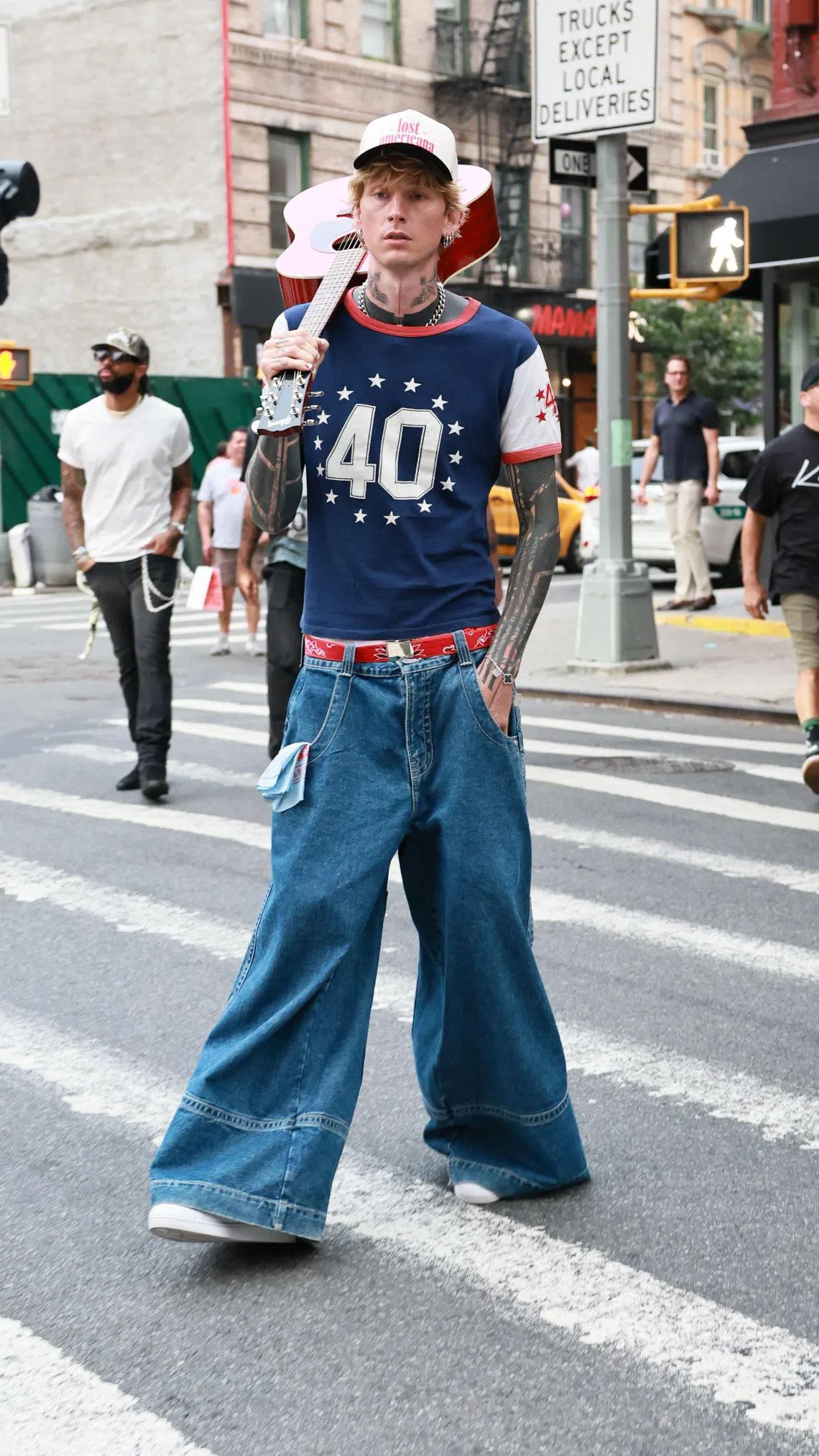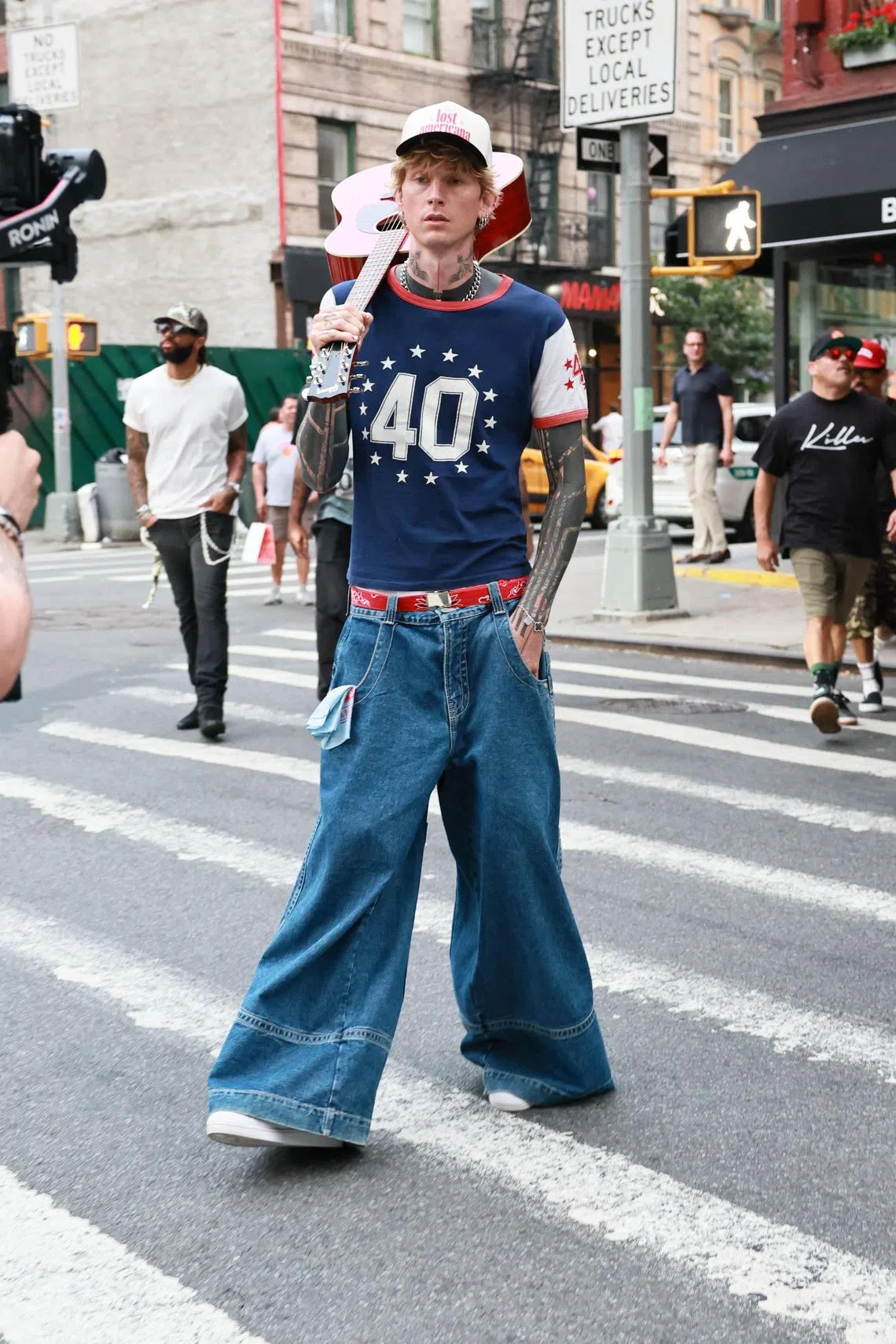One-time rapper MGK, formerly Machine Gun Kelly, does not want to be cool any more
Sign up now: Get ST's newsletters delivered to your inbox

Rapper-singer MGK's new album, Lost Americana, came out on Aug 8.
PHOTOS: THEA TRAFF/NYTIMES
Joe Coscarelli and Jon Caramanica
Follow topic:
NEW YORK – Before American singer-songwriter Bob Dylan delivered him an out-of-the-blue stamp of approval earlier in 2025, American rapper and singer MGK was on unsteady ground.
He had just returned from an extended stay at a rehabilitation facility amid a high-profile break-up with American actress Megan Fox, who was expecting the couple’s first child (their daughter was born in March).
The Los Angeles fires had destroyed his favourite studio. And he had scrapped some two years of work on a new album, opting to pursue a new genre-agnostic, mostly pure pop direction. Everything felt far from certain.
Then, in February, a decade-old clip of MGK rapping in a Central Florida record store appeared on Dylan’s cryptic Instagram account.
“Everything on his grid is black-and-white and old – either it’s Malcolm X or, like, dead jazz players,” said MGK, born Colson Baker and formerly known as Machine Gun Kelly. “I’m like, okay, how do I fit in here? What’s going on? It’s like a D-side MGK video from, like, the 17th page of my YouTube channel.”
After a period of disbelief, MGK began inching towards meeting the reclusive rock legend. They finally came face to face in May, following a Dylan performance at the Hollywood Bowl.
Not long after, MGK announced his new album, Lost Americana, with a video narrated by that familiar – but rarely heard – voice, intoning about “a sonic map of forgotten places, a tribute to the spirit of reinvention and a quest to reclaim the essence of American freedom”.
“He’s the most elusive snow leopard,” MGK, 35, said of Dylan, 84, explaining his decision to take his idol’s approval – along with that of Rolling Stones frontman Mick Jagger – as a sign that he was on the correct path.
Lost Americana, which came out on Aug 8, is the result of that newfound confidence, yet another reinvention for a polarising artiste.
Having come to prominence as an aggressive white rapper claiming Cleveland, MGK made a mainstream name as a worthy opponent of American rapper Eminem, a fellow chip-on-his-shoulder outsider who had grown from a Midwestern battle rap scene.
The Covid-19 pandemic saw MGK’s pivot to pop-punk, which resulted in a pair of No. 1 albums, as well as his turn as a tabloid-trailed celebrity boyfriend.
Now, he is doing dance choreography in the brightly coloured music video for Cliche, and attempting to meet his fans, detractors and lifelong demons with a clear head and a lack of pretence.
“There’s no beguiling on this album,” he said. “This album is not a character.”
In a winding conversation, MGK was at turns edgy and gregarious, discussing how an adolescence filled with abuse and bullying led to his pursuit of being the “anti-bro”, and why he needs to self-destruct before he can create. These are edited excerpts from the interview.
The Bob Dylan Instagram – what happened?
I was having a rant in my sunken living room pit about: “Is this the right album we’re making?” Because in my heart, my DNA is hip-hop, and half of my fan base is like, “Make this rap album that we have been promised.”
I am having that conversation and tripping out. I am about to erase everything again. And someone goes: “Dude, Bob Dylan just posted you.” We watched it and were like, damn, that was hard.
Bob liking me as a rapper blew my mind. Bob’s the original – (Subterranean Homesick Blues) is the original rap song.
Then, I just came here a couple of days ago after having dinner with Mick Jagger in London. It is just these Thanos stones. That is the beauty of manifestation and how the universe has aligned with this album so brilliantly.
Mick Jagger had that quote, something along the lines of: “MGK is making rock ’n’ roll fun again.” When they sit down with me, I am so curious and also awkward, so I just want to immediately ask questions: Hey, any Michael Jackson stories, any Prince stories?
You talk about yourself as a punching bag on the internet for people who say you make bad music. At the same time, you’ve had a huge amount of success in your life, dating all the way back to before you were famous. Do you not allow yourself to feel your wins because you won’t have any motivation left?

MGK’s Lost Americana surprise pop-up performance at Cellar Dog in New York City on Aug 5.
PHOTO: AFP
I say it on the first track of Lost Americana: “All the pages are blank until my life goes to (expletive)/I know I do that on purpose just to write again.” Great bar. It truly sums up the totality of what I do almost before every album cycle.
We watched it with this one; you can see it in the news. I’ve got to ruin everything so that I can talk about something because that is the only truth. I’ve put so much weight on my art that I will bleed out and die for this.
But I’ve never even thought about kids on the internet associating me with bad music because when I walk the streets, when I sell out arenas – it is not easy to make some of the vulnerable or bold choices I’ve made.
People know you as a tabloid figure, but they don’t know that you lived all around the world as a kid. How did that influence who you are today and the enemies you’re still fighting back against?

MGK’s Lost Americana surprise pop-up performance at Cellar Dog in New York City, on Aug 5.
PHOTO: AFP
I lived in Africa until I was six. So with that, your entire subconscious, those really formative years, you’re growing up among so many different cultures, prayers, skin colours, ethnicities. I grew up with a very open heart and open mind.
When I moved to America, I became a product of bullying. I was very tall; my mum and dad split; poverty ate up my clothes. I was the guy who went and got the wrong ear pierced, didn’t know which one was the cool one. I acted goofy – I was obsessed with (Canadian-American actor) Jim Carrey, so I would do all these impressions, and everyone was just like: “What’s up with Ace Ventura over here?”
At the same time, my house was very dark. I was living in my aunt’s basement with my dad, and it was really abusive. Listerine to this day triggers me so hard because I shared a bed with my dad, and he would always go and throw up in the morning, and come back in the bed and have Listerine on his breath.
I grew up in a very masculine house. It was the type where I would come downstairs, and my dad would be like: “You’re dressed like a (expletive), go change.” I had many years of being like, “Where’s my mum?”
And then, 15 years later, after he passed, my mum and I find this reconnection, and I ended up learning all of these false narratives I was fed as a kid.
It was so unfair to that little boy because when you look around and the two people who are supposed to unconditionally love you – one isn’t there and the other person is just beating all of their own issues with life, all of their unsatisfaction into you, and then you go to school and you are getting jumped or laughed at.
I didn’t feel safe anywhere. I moved to the attic because at least I could hear the feet coming, so I could be prepared by the time my dad got upstairs for whatever was going to happen to me.
You said you feel like you have stripped away all the cool. I think a lot of people from the outside looking in will look at you and say, well, this guy’s been cool for more than a decade, but you are saying, hey, it is actually time to shed all that.

MGK performing on the Today Show as part of the Citi Concert Series in New York City on June 20.
PHOTO: REUTERS
Any interview of me in my 20s, it makes me cringe to the max. But you need the arc of dumb-a** to be enlightened.
I think there was a characterisation that I was playing into that really loved being a polarising figure. When I’m at home at night, though, if you look at my astrological chart, it’s one of the most sensitive charts that exist.
Among other gnarly diagnoses that I have, hypersensitivity is one. So, I have a hard shell. I grew up a battle rapper. I am prepped for war pretty much at all times. But the truth is, it felt much more satiating to the broken boy in me to be simpatico versus being the polarising figure.
I also have been showing a goofier side of myself – the anti-bro. I don’t care that my nails are painted. I don’t care that I have an androgynous look. I don’t care to fit into whatever the mould is of what they think a rapper should be. NYTIMES

